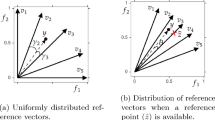Abstract
Surrogate-Assisted Evolutionary Algorithms (SAEAs) have been proven to be very effective in solving (synthetic and real-world) computationally expensive optimization problems with a limited number of function evaluations. The two main components of SAEAs are: the surrogate model and the evolutionary optimizer, both of which use parameters to control their respective behavior. These parameters are likely to interact closely, and hence the exploitation of any such relationships may lead to the design of an enhanced SAEA. In this chapter, as a first step, we focus on Kriging and the Efficient Global Optimization (EGO) framework. We discuss potentially profitable ways of a better integration of model and optimizer. Furthermore, we investigate in depth how different parameters of the model and the optimizer impact optimization results. In particular, we determine whether there are any interactions between these parameters, and how the problem characteristics impact optimization results. In the experimental study, we use the popular Black-Box Optimization Benchmarking (BBOB) testbed. Interestingly, the analysis finds no evidence for significant interactions between model and optimizer parameters, but independently their performance has a significant interaction with the objective function. Based on our results, we make recommendations on how best to configure EGO.
All authors contributed equally to this work.
Access this chapter
Tax calculation will be finalised at checkout
Purchases are for personal use only
Similar content being viewed by others
Notes
- 1.
It should be noted that it is common to use maximum likelihood estimation of hyperparameters rather than integrating over all possible hyperparameters given a prior probability distribution. Although some research suggest it aids the optimization process, but it may increase the overall computation time [42].
- 2.
Rank models are also important in the domain of multi-objective optimization. Here, ranks can be easily produced (via non-dominated sorting), whereas numeric indicators (such as crowding distance or hypervolume) are still subject of current research. Rank-based models would allow to represent multiple objectives with just one single surrogate model.
- 3.
We used limited memory BFGS with five restarts to estimate the hyperparameters [1].
References
GPy: a Gaussian process framework in python (since 2012). http://github.com/SheffieldML/GPy
Acar, E., Rais-Rohani, M.: Ensemble of metamodels with optimized weight factors. Struct. Multidiscip. Optim. 37(3), 279–294 (2009)
Aggarwal, C.C., Hinneburg, A., Keim, D.A.: On the surprising behavior of distance metrics in high dimensional space. In: Database Theory — ICDT 2001, pp. 420–434. Springer Science + Business Media, Berlin (2001)
Andrianakis, I., Vernon, I.R., McCreesh, N., McKinley, T.J., Oakley, J.E., Nsubuga, R.N., Goldstein, M., White, R.G.: Bayesian history matching of complex infectious disease models using emulation: a tutorial and a case study on HIV in Uganda. PLoS Comput. Biol. 11(1), 1–18 (2015)
Barber, D.: Bayesian Reasoning and Machine Learning. Cambridge University Press, Cambridge (2012)
Bartz-Beielstein, T.: A survey of model-based methods for global optimization. In: Papa, G., Mernik, M. (eds.) Bioinspired Optimization Methods and Their Applications, pp. 1–18 (2016)
Bull, A.D.: Convergence rates of efficient global optimization algorithms. J. Mach. Learn. Res. 12, 2879–2904 (2011)
Chugh, T., Sindhya, K., Hakanen, J., Miettinen, K.: A survey on handling computationally expensive multiobjective optimization problems with evolutionary algorithms. Soft Comput. 23(9), 3137–3166 (2019). https://doi.org/10.1007/s00500-017-2965-0
Chugh, T., Jin, Y., Miettinen, K., Hakanen, J., Sindhya, K.: A surrogate-assisted reference vector guided evolutionary algorithm for computationally expensive many-objective optimization. IEEE Trans. Evol. Comput. 22(1), 129–142 (2018). https://doi.org/10.1109/TEVC.2016.262230 (to appear)
Coello, C., Lamont, G., Veldhuizen, D.: Evolutionary Algorithms for Solving Multi-objective Problems, 2nd edn. Springer, New York (2007)
Couckuyt, I., Deschrijver, D., Dhaene, T.: Fast calculation of multiobjective probability of improvement and expected improvement criteria for Pareto optimization. J. Glob. Optim. 60, 575–594 (2014)
Deb, K.: Multi-objective Optimization Using Evolutionary Algorithms. Wiley, Chichester (2001)
Eiben, A., Smit, S.: Parameter tuning for configuring and analyzing evolutionary algorithms. Swarm Evol. Comput. 1(1), 19–31 (2011)
Forrester, A., Sobester, A., Keane, A.: Engineering Design via Surrogate Modelling. Wiley, New York (2008)
Forrester, A.I., Sóbester, A., Keane, A.J.: Multi-fidelity optimization via surrogate modelling. Proc. R. Soc. A: Math. Phys. Eng. Sci. 463(2088), 3251–3269 (2007)
Fortin, F.A., De Rainville, F.M., Gardner, M.A., Parizeau, M., Gagné, C.: DEAP: evolutionary algorithms made easy. J. Mach. Learn. Res. 13, 2171–2175 (2012)
Hansen, N.: Compilation of results on the 2005 CEC benchmark functions (2005)
Hansen, N., Finck, S., Ros, R., Auger, A.: Real-parameter black-box optimization benchmarking 2009: noiseless functions definitions. Research report RR-6829, INRIA (2009)
Hansen, N., Auger, A., Mersmann, O., Tušar, T., Brockhoff, D.: COCO: a platform for comparing continuous optimizers in a black-box setting (2016). arXiv:1603.08785
Hauschild, M., Pelikan, M.: An introduction and survey of estimation of distribution algorithms. Swarm Evol. Comput. 1(3), 111–128 (2011)
Hutter, F., Hoos, H.H., Leyton-Brown, K.: Sequential model-based optimization for general algorithm configuration (extended version). Technical report TR-2010-10, University of British Columbia, Department of Computer Science (2010)
Jin, Y.: Surrogate-assisted evolutionary computation: recent advances and future challenges. Swarm Evol. Comput. 1(2), 61–70 (2011)
Jones, D., Schonlau, M., Welch, W.: Efficient global optimization of expensive black-box functions. J. Glob. Optim. 13, 455–492 (1998)
Knowles, J.: ParEGO: a hybrid algorithm with on-line landscape approximation for expensive multiobjective optimization problems. IEEE Trans. Evol. Comput. 10, 50–66 (2006)
Lane, F., Azad, R.M.A., Ryan, C.: Principled evolutionary algorithm search operator design and the kernel trick. In: 2016 IEEE Symposium Series on Computational Intelligence (SSCI), pp. 1–9 (2016). https://doi.org/10.1109/SSCI.2016.7850204
Le, M.N., Ong, Y.S., Menzel, S., Jin, Y., Sendhoff, B.: Evolution by adapting surrogates. Evol. Comput. 21(2), 313–340 (2013)
Lim, D., Jin, Y.: Generalizing surrogate-assisted evolutionary computation. IEEE Trans. Evol. Comput. 14, 329–354 (2010)
Lockwood, B.A., Anitescu, M.: Gradient-enhanced universal Kriging for uncertainty propagation. Nucl. Sci. Eng. 170(2), 168–195 (2012)
Loshchilov, I., Schoenauer, M., Sebag, M.: Dominance-based Pareto-surrogate for multi-objective optimization. In: Deb, K., et al. (eds.) Simulated Evolution and Learning (SEAL 2010). LNCS, vol. 6457, pp. 230–239. Springer, Berlin (2010)
Mckay, M., Beckman, R., Conover, W.: A comparison of three methods for selecting values of input variables in the analysis of output from a computer code. Technometrics 42, 55–61 (2000)
Mogilicharla, A., Chugh, T., Majumder, S., Mitra, K.: Multi-objective optimization of bulk vinyl acetate polymerization with branching. Mater. Manuf. Process. 29, 210–217 (2014)
Montgomery, D.C.: Design and Analysis of Experiments, 5th edn. Wiley, New York (1997)
Moscato, P., Cotta, C.: A Gentle Introduction to Memetic Algorithms, pp. 105–144. Springer, Boston (2003)
Oyama, A., Okabe, Y., Shimoyama, K., Fujii, K.: Aerodynamic multiobjective design exploration of a flapping airfoil using a Navier-Stokes solver. J. Aerosp. Comput. Inf. Commun. 6, 256–270 (2009)
Ponweiser, W., Wagner, T., Biermann, D., Vincze, M.: Multiobjective optimization on a limited budget of evaluations using model-assisted S-metric selection. In: Proceedings of the Parallel Problem Solving from Nature-PPSN X, pp. 784–794. Springer, Berlin (2008)
Rahat, A.A.M., Everson, R.M., Fieldsend, J.E.: Alternative infill strategies for expensive multi-objective optimisation. In: Proceedings of the Genetic and Evolutionary Computation Conference, pp. 873–880. ACM (2017)
Rasmussen, C.E., Williams, C.K.I.: Gaussian Processes for Machine Learning. The MIT Press, Cambridge (2006)
Runarsson, T.P.: Ordinal regression in evolutionary computation. In: Runarsson, T.P., Beyer, H.G., Burke, E., Merelo-Guervós, J.J., Whitley, L.D., Yao, X. (eds.) Parallel Problem Solving from Nature - PPSN IX: 9th International Conference, Reykjavik, Iceland, 9–13 September 2006, Proceedings, pp. 1048–1057. Springer, Berlin (2006)
Shahriari, B., Swersky, K., Wang, Z., Adams, R.P., de Freitas, N.: Taking the human out of the loop: a review of Bayesian optimization. Proc. IEEE 104(1), 148–175 (2016)
Singh, H., Ray, T., Smith, W.: Surrogate assisted simulated annealing (SASA) for constrained multi-objective optimization. In: Proceedings of the IEEE Congress on Evolutionary Computation, pp. 1–8. IEEE (2010)
Snelson, E., Ghahramani, Z.: Sparse Gaussian processes using pseudo-inputs. Adv. Neural Inf. Process. Syst. 18, 1257 (2006)
Snoek, J., Larochelle, H., Adams, R.P.: Practical Bayesian optimization of machine learning algorithms. In: Advances in Neural Information Processing Systems, pp. 2951–2959 (2012)
Tripathy, R., Bilionis, I., Gonzalez, M.: Gaussian processes with built-in dimensionality reduction: applications to high-dimensional uncertainty propagation. J. Comput. Phys. 321, 191–223 (2016)
Ursem, R.K.: From Expected Improvement to Investment Portfolio Improvement: Spreading the Risk in Kriging-Based Optimization, pp. 362–372. Springer International Publishing, Cham (2014)
Volz, V., Rudolph, G., Naujoks, B.: Surrogate-assisted partial order-based evolutionary optimisation. In: Conference on Evolutionary Multi-Criterion Optimization (EMO), pp. 639–653. Springer, Cham (2017)
Wang, H., van Stein, B., Emmerich, M., Bäck, T.: Time complexity reduction in efficient global optimization using cluster Kriging. In: Proceedings of the Genetic and Evolutionary Computation Conference, GECCO’17, pp. 889–896. ACM, New York (2017)
Weihs, C.: MOI-MBO: multiobjective infill for parallel model-based optimization. In: Learning and Intelligent Optimization: 8th International Conference, Lion 8, Gainesville, FL, USA, 16–21 February 2014. Revised Selected Papers, vol. 8426, p. 173. Springer (2014)
Wessing, S., Preuss, M.: The true destination of EGO is multi-local optimization (2017). arXiv:1704.05724
Yao, X.: An empirical study of genetic operators in genetic algorithms. Microprocess. Microprogram. 38(1), 707–714 (1993)
Zaefferer, M., Stork, J., Friese, M., Fischbach, A., Naujoks, B., Bartz-Beielstein, T.: Efficient global optimization for combinatorial problems. In: Proceedings of the 2014 Conference on Genetic and Evolutionary Computation, GECCO’14, pp. 871–878. ACM, New York (2014)
Acknowledgements
Parts of this work are the result of the discussions at the Surrogate-Assisted Multi-Criteria Optimization (SAMCO) Lorentz Center Workshop in Leiden, NL (February 29, 2016 till March 4, 2016). The research of Tinkle Chugh was supported by the FiDiPro project DeCoMo funded by Tekes: Finnish Funding Agency for Innovation and Natural Environment Research Council [grant number NE/P017436/1]. Alma Rahat was supported by the Engineering and Physical Sciences Research Council, UK [grant number EP/M017915/1]. The research of Martin Zaefferer is part of a project that has received funding from the European Union’s Horizon 2020 research and innovation program under grant agreement No. 692286.
Author information
Authors and Affiliations
Corresponding author
Editor information
Editors and Affiliations
Rights and permissions
Copyright information
© 2020 Springer Nature Switzerland AG
About this chapter
Cite this chapter
Chugh, T., Rahat, A., Volz, V., Zaefferer, M. (2020). Towards Better Integration of Surrogate Models and Optimizers. In: Bartz-Beielstein, T., Filipič, B., Korošec, P., Talbi, EG. (eds) High-Performance Simulation-Based Optimization. Studies in Computational Intelligence, vol 833. Springer, Cham. https://doi.org/10.1007/978-3-030-18764-4_7
Download citation
DOI: https://doi.org/10.1007/978-3-030-18764-4_7
Published:
Publisher Name: Springer, Cham
Print ISBN: 978-3-030-18763-7
Online ISBN: 978-3-030-18764-4
eBook Packages: Intelligent Technologies and RoboticsIntelligent Technologies and Robotics (R0)




